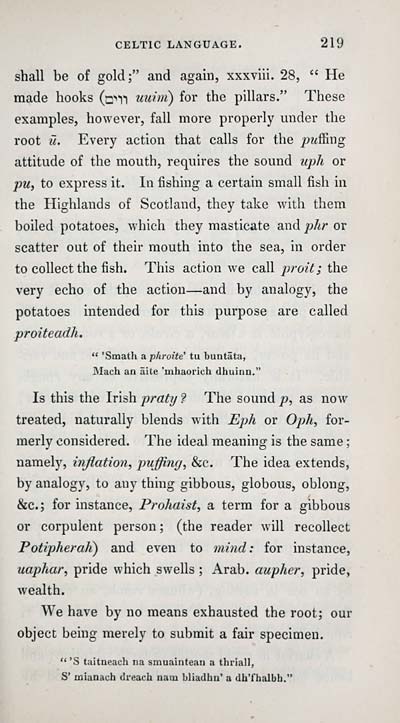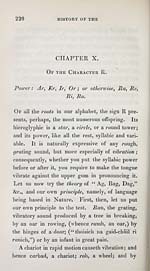Download files
Complete book:
Individual page:
Thumbnail gallery: Grid view | List view

CELTIC LANGUAGE. 219
shall be of gold;" and again, xxxviii. 28, " He
made hooks (rz^iT uuim) for the pillars." These
examples, however, fall more properly under the
root ù. Every action that calls for the jai^ffing
attitude of the mouth, requires the sound uph or
pu, to express it. In fishing a certain small fìsh in
the Highlands of Scotland, they take with them
boiled potatoes, which they masticate and jìhr or
scatter out of their raouth into the sea, in order
to coUect the fìsh. This action we call proit; the
very echo of the action — and by analogy, the
potatoes intended for this purpose are called
proiteadh.
" 'Smath a phroite' tu buntàta,
Mach an àite 'mhaorich dhuinn."
Is this the Irish praty ? The sound p, as now^
treated, naturally blends with Eph or Oph, for-
merly eonsidered. The ideal meaning is the same ;
namely, injlation, puffing, &c. The idea extends,
by analogy, to any thing gibbous, globous, oblong,
&c.; for instance, Prohaist, a term for a gibbous
or corpulent person ; (the reader will recollect
Potipherah) and even to mind: for instance,
uaphar, pride which swells ; Arab. aupher, pride,
wealth.
We have by no means exhausted the root; our
object being merely to submit a fair specimen.
" 'S taitneach iia smuaintean a thriall,
S' mianach dreach nam bliadhu' a dh'fhalbh."
shall be of gold;" and again, xxxviii. 28, " He
made hooks (rz^iT uuim) for the pillars." These
examples, however, fall more properly under the
root ù. Every action that calls for the jai^ffing
attitude of the mouth, requires the sound uph or
pu, to express it. In fishing a certain small fìsh in
the Highlands of Scotland, they take with them
boiled potatoes, which they masticate and jìhr or
scatter out of their raouth into the sea, in order
to coUect the fìsh. This action we call proit; the
very echo of the action — and by analogy, the
potatoes intended for this purpose are called
proiteadh.
" 'Smath a phroite' tu buntàta,
Mach an àite 'mhaorich dhuinn."
Is this the Irish praty ? The sound p, as now^
treated, naturally blends with Eph or Oph, for-
merly eonsidered. The ideal meaning is the same ;
namely, injlation, puffing, &c. The idea extends,
by analogy, to any thing gibbous, globous, oblong,
&c.; for instance, Prohaist, a term for a gibbous
or corpulent person ; (the reader will recollect
Potipherah) and even to mind: for instance,
uaphar, pride which swells ; Arab. aupher, pride,
wealth.
We have by no means exhausted the root; our
object being merely to submit a fair specimen.
" 'S taitneach iia smuaintean a thriall,
S' mianach dreach nam bliadhu' a dh'fhalbh."
Set display mode to: Large image | Transcription
Images and transcriptions on this page, including medium image downloads, may be used under the Creative Commons Attribution 4.0 International Licence unless otherwise stated. ![]()
| Early Gaelic Book Collections > Hew Morrison Collection > Adhamh agus Eubh, no Craobh Sheanachais nan Gàël > (349) |
|---|
| Permanent URL | https://digital.nls.uk/76900881 |
|---|
| Description | A selection of items from a collection of 320 volumes and 30 pamphlets of literary and religious works in Scottish Gaelic. From the personal library of Hew Morrison, the first City Librarian of Edinburgh. |
|---|
| Description | Selected items from five 'Special and Named Printed Collections'. Includes books in Gaelic and other Celtic languages, works about the Gaels, their languages, literature, culture and history. |
|---|

